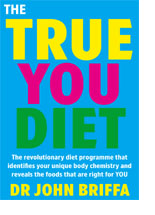This week saw the publication of my latest book The True You Diet. One of the basic premises of the book is that our nutritional needs vary from person to person. Science and a ton of clinical experience show that while someone may thrive of a diet quite rich in ‘heavy’ foods such as meat and butter, others do best on ‘lighter’ diets rich in, say, fruit and vegetables. In the book I reveal the research which proves the dictum that ‘one person’s meat can indeed be another’s poison’!
As luck would have it, the concept that ideal diets can vary between individual to individual was demonstrated just a couple of weeks back in a study published in the Journal of the American Medical Association [1]. In this study, 73 individuals aged 18-35 were put on a low fat or low glycaemic load (essentially, a low-carb diet) for a period of 6 months. Overall, the weight loss between the two groups did not differ significantly.
However, those of the low glycaemic load (GL) diet enjoyed higher levels of improvement in the levels of ‘healthy’ HDL (high density lipoprotein) cholesterol and ‘unhealthy’ triglycerides compared to those eating the low fat diet. The researchers went on to analyse the data in a little more depth, though, and this is when things got really interesting.
At the start of the study, the researchers had also subjected the participants to what is known as a ‘glucose insulin tolerance test’. Basically, this involves giving individuals a load of sugar and then seeing what happens to their blood sugar and insulin levels for some time after this. Raised levels of sugar and insulin are regarded as undesirable, and a sign of problems with being able to moderate blood sugar levels in the body. High levels of insulin are particularly linked with the conditions ‘metabolic syndrome’ and type 2 diabetes.
The researchers found that individuals who initially had higher levels of insulin at the start of the study had very different responses to the two diets. 18 months after the diet started, these individuals had lost an average of 12.8 lbs (5.8 kg) on the low GL diet compared to just 2.6 lbs (1.2 kg) on the low-fat diet.
What are we to conclude from this ” essentially that individuals who tend to run high levels of insulin seem to do better on low-carb rather than low-fat diets. Should we be surprised? Not really, when we consider that high levels of insulin is generally taken as a sign of an impaired ability to handle carbohydrates (i.e. sugar and starch) in the diet.
In The True You Diet I explain the differences in our internal biochemistry that dictate whether the most appropriate diet for us is essentially one that is quite high in fat and low in carb, or relatively high in carb and low in fat. Anyone wondering why such differences exist may want to look back at our evolution. It is my contention that some people are, deep down in their DNA, essentially ‘hunters’, and do well on a diet rich in animal foods. While those of us who are ‘gatherers’ do better on lower-fat fare such as fruit and vegetables. Other, fall somewhere in between these extremes and perhaps can be regarded as true ‘hunter-gatherers’.
Within The True You Diet I have included a questionnaire which can be used to determine which of these 3 ‘types’ you are. Each type is given food suggestions, meal plans and specifically-designed recipes to help them incorporate their ideal diet into their lives.
To coincide with the publication of The True You Diet I have also launched www.thetrueyoudiet.com which provides more information about the book. A free download is available there which includes an unedited version of the introduction to the book, chapter summaries and an abridged questionnaire. Completing this will give you a good idea of your ‘type’ and help lead you to your ideal diet. At the new site you can also sign up for my regular ‘True You Tips’ emails which are designed to inspire, inform and support you along your way to enhanced healthy and vitality.
The True You Diet is published, at this time, in the UK only. However, wherever you are, the book is available for purchase through amazon.co.uk.

References:
1. Ebbeling CB, et al. Effects of a low-glycemic load vs low-fat diet in obese young adults: a randomized trial. JAMA. 2007;297(19):2092-102.